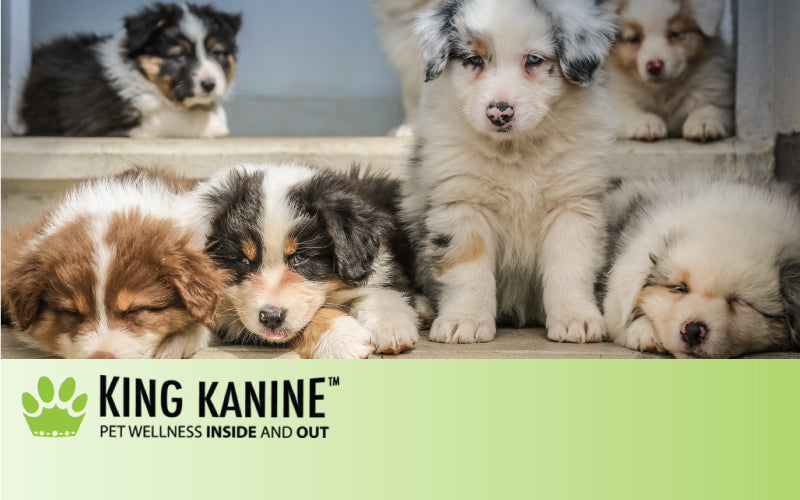
September 30, 2022 6 min read

One of the most popular healthcare trends in recent history is CBD. CBD became the first cannabis component to gain the recognition and praise that led it to its present level of popularity; earlier, cannabis compounds were banned. This health obsession was certain to eventually expand to our dogs, and now it has. Pet parents are actively using CBD products to help their pets with a range of conditions.
Today, a wide range of CBD products, including CBD treats, capsules, and even toys, are made expressly for dogs. Is CBD oil the same for our pets as it is for adults? CBD is promoted as a natural substance that is safe to use. Let's look more closely into CBD for dogs and know whether CBD can cause diarrhea in dogs.

Cannabidiol, sometimes known as CBD, is a chemical substance present in both marijuana and hemp, derived from the cannabis plant. Cannabidiol is a non-psychoactive substance, in contrast to cannabis, which is well known for its psychoactive properties. This implies that unlike other cannabis products containing tetrahydrocannabinol, often known as THC, dog CBD oil does not result in a euphoric state.
THC is primarily responsible for the psychoactive consequences of cannabis, but CBD also has several other well-known good effects, including a variety of health advantages. It is crucial to remember that the FDA has still not declared if CBD oil is safe to use as a food ingredient, nutritional supplement, or medication for animals. No drugs have been licensed for use in animals, even though there is one FDA-approved human drug that contains CBD.

It has been proven that CBD provides advantages for human beings. It is widely used to treat conditions including seizures, anxiety, and post-traumatic stress disorder, for example. It's crucial to keep in mind that neither prescribed nor over-the-counter CBD products have FDA approval for usage in animals. This indicates that before being launched onto the market, the items might not have undergone safety or efficacy testing. Additionally, some businesses may make unsubstantiated medical claims about their goods that haven't been examined or approved. Animals consuming CBD exhibit side effects that are very comparable to those that people do. The likelihood that your pet will experience side effects increases typically with too much CBD oil that you administer to them.

All pet owners want their dogs to stay in a happy and healthy state. However, one of the most serious and terrible negative effects of CBD oil for dogs could be diarrhea. Initially, it could be challenging to tell whether your dog's digestive issues are indeed due to the CBD oil or are instead the result of your dog's normal, frequently suspicious dietary habits. However, one approach to see if CBD is the source of your dog's diarrhea is to attempt and fully eliminate it from his routine. Before you make a decision, consider all potential variables.
You can check this by having your dog continue eating normally without the CBD and then seeing if diarrhea clears itself. If it disappears but reappears after you give your dog CBD again, it's time to reevaluate providing CBD oil to your dog. However, it could be appropriate to see your veterinarian if diarrhea returns in any case.
Dogs can develop diarrhea for a variety of reasons, such as drinking contaminated water or chewing on something they definitely shouldn't have, as dogs often do. An upset stomach might be brought on by almost anything your dog is unfamiliar with eating. The guts of many dogs will suffer even from changing dog diets. CBD is no exception, and particularly in high quantities, it can be very uncomfortable for your dog. After receiving their initial dose of CBD, animals may develop minor diarrhea even when they consume a diverse and balanced diet. Too much CBD can also lead to diarrhea as this directly impacts their livers which produce liver enzymes. Typically, this just occurs once or twice, max, and then never thereafter.
The most common reason for diarrhea or GI distress when using CBD oil is the oil itself. These are the typical carriers we find manufacturers using in their compositions: olive oil, coconut oil, MCT oil, or hemp oil. Simply switch to a formula with coconut oil or MCT oil if your pet is reacting poorly to an olive oil carrier.
Diarrhea is not very harmful on its own and normally goes away in a couple of days. But depending on the underlying reason, it may suggest infections and other more severe issues that shouldn't be disregarded.
The following factors should be taken into account when determining how severe your pet's stool is:
You should seek advice from your vet if these signs last for over a few days, particularly if you notice blood in their stools. These issues frequently point to bacterial, parasitic, or chronic illnesses that, if not addressed, might seriously harm your pet.
Dehydration is one of the primary difficulties associated with chronic diarrhea. It's critical to understand the warning indications when something is healthy and normal because this is extremely harmful to little dogs.
There are a few techniques to determine whether your pet is dehydrated:

Place stress on your dog's gums with your fingers. They are properly hydrated if the color soon restores to its original pinkish hue. If it ends up taking a few seconds for the blood to restore to the spot once you withdraw your finger, they are certainly dehydrated.

Draw their neck's upper skin upwards while distant from their backbone. If it rapidly returns to its original posture, the dog is well-hydrated. They're probably dehydrated if it requires over a few seconds for the skin to settle back into its normal resting state.
You might not always be certain of the situation you are in. It could be challenging to recognize when things have altered negatively if you're not very acquainted with your pet's excrement. The best protection is to learn more about what's happening before it becomes an issue. By doing so, you can clear out the risk if your pet's stool is loose after you've introduced a safe cannabis product.
Tiredness or laziness is also another frequent adverse effect of cannabis use in individuals. Even though CBD doesn't include any THC, your dog might still appear lethargic after receiving a CBD dose. If your dog becomes sleepy after taking a dose of CBD, you may seek to reduce the dose size because this is typically the result of an excessive amount.
One of the adverse reactions of CBD is dizziness. Your dog may experience vertigo from CBD as well. You'll need to watch out for symptoms of your dog's vertigo, such as difficulty getting to its feet or frequent falls. This is quite likely to happen if the CBD you're taking isn't pure and has traces of THC, the psychoactive ingredient in cannabis that gives consumers a "high."
Your dog may exhibit excessive scratching, biting, and itching after receiving a CBD dose or other drugs. If so, you should either lower the dosage or stop taking it completely. Even if this is not a side effect that happens frequently, it is conceivable and something you need to watch out for.
It has been demonstrated that high doses of CBD can temporarily lower blood pressure. Your dog won't like feeling dizzy as a result of this. Lowering the dosage you give your dog should assist to minimize this negative impact because it is typically dose-dependent.
Severe stomach distress frequently results in nausea and vomiting. This can be due to the substance itself, or it could simply be the flavor. Your dog might not enjoy the taste of CBD because it is a pretty bitter chemical. However, if the CBD sufficiently irritates your dog's stomach, they'll probably throw it right back up.
Most individuals know that cannabis can make people develop cottonmouth, but CBD could also do the same thing to your dog. Although it may be unpleasant that your dog slobbers all over the place, it is necessary for their well-being. Dry mouth from CBD can lead to poor dental health, offensive breath, and even tooth loss in dogs.
Treating epilepsy is one of the biggest reasons individuals use CBD for themselves or their dogs. As a result, you might believe that it's a useful substance for treating Parkinson's disease. Regrettably, CBD can make Parkinson's-related tremors worse in both dogs and humans.
Reduced saliva may also indicate that your dog will try to make up for the dehydration in its throat and mouth by consuming more water. While not necessarily negative, that serves more as a band-aid fix for your dog's dry mouth than a long-term fix.
Even though hemp oil as well as CBD for dogs are becoming incredibly popular holistic treatments, it's still vital to learn as much as you could about these products' negative effects to make sure that your dog stays safe and well during his or her CBD journey. There may be some changes in your dog's food as a result of the addition of CBD oil, but you shouldn't be concerned. The long-term advantages for the stomach exceed any immediate effects a small amount of oil in your dog's diet might have on their stomachs.